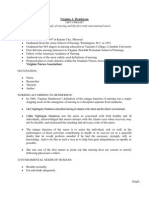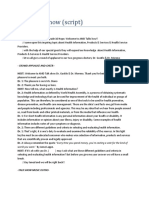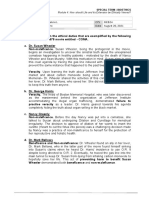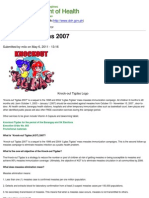Informative Essay Final Draft
Informative Essay Final Draft
Uploaded by
api-302021014Copyright:
Available Formats
Informative Essay Final Draft
Informative Essay Final Draft
Uploaded by
api-302021014Original Title
Copyright
Available Formats
Share this document
Did you find this document useful?
Is this content inappropriate?
Copyright:
Available Formats
Informative Essay Final Draft
Informative Essay Final Draft
Uploaded by
api-302021014Copyright:
Available Formats
Running head: THE NURSE WHO CHANGED IT ALL
The Nurse Who Change it All The Impacts of Florence Nightingale on Nursing
Elizabeth N. Meston
University of Kentucky
THE NURSE WHO CHANGED IT ALL
Abstract
In this paper, I explored the life of Florence Nightingale and the contributions she made to the
field of nursing. She devoted the majority of her life to enriching the filed of nursing,
overcoming many adversities such as lack of support from her mother. Despite this, she did not
succumb to the negativity in her pursuits of becoming a nurse (Florence Nightingale, n.d.). I
have personally been largely influenced by her perseverance as well as her kind nature that was
demonstrated to patients that were placed in hospitals overseas. As a result of her exposure in
the Crimean War she came to understand the necessity of reforms needed in hospitals (Cohen,
1984). Her time overseas during the war further fueled her inspiration that also lead to reforms
in London for the nursing profession as a whole. Nightingale was an inspiration to many
individuals as she provided a new perception of nursing, compared the similarities between our
lives that have served as an inspiration to me as I hope to pursue a career in the field of nursing.
THE NURSE WHO CHANGED IT ALL
The Nurse Who Change it All The Impacts of Florence Nightingale on Nursing
International Nurses Day is celebrated on perhaps one of the most important days for
nurses - May 12th - Florence Nightingales birthday (5 Things You, n.d.). Nightingale strived
throughout her life to change the way nurses were treated by improving the care of those in
hospitals. She was always a diligent worker who persevered through many aspects of her life
despite the doubts placed upon her. Nowadays, nurses require proper educations while back in
the day were often able to take up a job easily and thus were not respected due to their lack of
education (Florence Nightingale, n.d.). Her work through her early childhood and career
changed the industry of nursing into a respected profession through her life experience of caring
for injured and sick soldiers at war. As a result of all of her experiences, she was able to identify
various areas which needed to be reformed within the nursing industry. Florence Nightingales
perseverance and compassion towards her patients influenced me to pursue a career in the field
of nursing.
Early Childhood and Career
Florence Nightingale was extremely motivated in pursuing a career and furthering her
studies during her adolescent years and the beginning of her adulthood life. She was very keen
on learning foreign languages in her childhood as well as focusing highly on her studies of
mathematics (Selanders, 2012). Her abundance of scholarly motivation provided her with a
variety of options as she grew older and had the need for travel as a nurse. Nightingale and I both
share an inclination to immerse ourselves in knowledge; a vital component of the field of
Nursing due to the wide variety of information necessary to aid others in the profession. From
when I was a young child, I was always highly motivated to learn more about doctors and nurses
as I had an intense interest for someone of the age of four; an interest that continued on
THE NURSE WHO CHANGED IT ALL
throughout my teenage and adolescent years. As Nightingale and I both share a large intellectual
motivation and perseverance, it can be assumed that we also share other traits as well, according
to the implicit personality theory (Verdeber, 2014). The similarities between Florences
intellectual abilities as well as other characteristics serve as a source of inspiration for me as I
study to become a nurse myself. Despite her motivation, Nightingales mother did not approve of
such a profession (Florence Nightingale, n.d.). Lack of support from her mother potentially
hindered Florences ability to pursue her career to the fullest. While she continued to pursue her
career throughout her adolescent and early adulthood years, there is no doubt that her mothers
absence hindered her confidence as she did not have the praise from such a close family member.
With my own pursuits of knowledge of the medical field, my mother and father always fueled
and supported any interests I had. As a result, I gained a support system to which I could turn to
if I had any adversities something that Nightingale unfortunately did not have available with
her mother. Family support is necessary when one goes after such a challenging pursuit such as a
career that is not deemed a profession at the time. Florence showed that even without full support
she still had the inclination and perseverance to go after such a far off career during her day and
age.
In addition to being highly motivated, Nightingale had to learn at a young age what it was
like to put others before herself. Similar to my childhood, Nightingale had to care for family
members that were not in the greatest state of health in her home (Florence Nightingale, 2015).
While Nightingale had to care for more than one individual, I gained the knowledge what it was
like to care for a sick parent as my mother became very ill in my mid teenage years. Through
helping to support and aid in treating my mother, I was able to gain more insight to what the
nursing field was like. Similarly, Nightingale gained experience caring for others in her home
THE NURSE WHO CHANGED IT ALL
which later provided resources for her future as she was familiar and exposed to the care that she
would later be administering in the war field. Without prior experience, Nightingales triumphs
may not have been as victorious as all of the work she was exposed to would not have served as
an example for her future work. Knowing that she overcame a multitude of adversities allows me
to adhere to the theory of self promotion as I use her life as an inspiration to fuel my pursuits in
the nursing industry. Nightingale overcame a multitude of issues between her career and family
background. She proved to me that anything is possible if I have the motivation and perseverance
to overcome challenges I may face later on.
Hospital Conditions
As her career began to jump start, Florence was able to learn the magnitude of help
needed in the nursing field. According to Cohen, (1984) the Crimean War proved to display the
need for reforms as the hospital barracks were infested with fleas and rats, among other
grotesque infestations and lack of sanitation observed by nightingale (p. 2). Before leaving to
help those in the Crimean War, Nightingales only experience caring for others was when she
was an adolescent. When exposed to the warzone, it is clear she utilized uncertainty reduction in
while observing the state of hospitals. Observations of the warzone allowed her to identify
specific changes that were needed, as well as serving as motivation to improve the healthcare
industry overall. After leaving the warzone, Nightingale proved to find her true inspiration and
purpose: to serve humanity through the prevention of needless illness and death (Cohen, 1984,
p.1). Her experience in the war proved the need for nurses in the war field to help aid in the care
of soldiers and to improve working conditions. The grotesque state of conditions for sick and
injured soldiers proved to be inspiration for change that she could provide. Her inspiration is
similar to the motivation I have to help aid those who are sick and injured both of us want to
THE NURSE WHO CHANGED IT ALL
change the state of certain aspects related to nursing. Nightingales experience overseas resulted
in further insight to the gravity of poor conditions for those in hospitals and the extent of change
needed involving the care of patients.
Hospital Reforms
Upon her return to London, Nightingale had an abundance of areas in hospitals that
needed to be reformed. During the war, she had found that necessary items for the care of
soldiers were scarce and poorly distributed (Cohen, 1984). When supplies to care for patients are
lacking, there is a diminished ability to be able to properly treat those who need medical care. As
a nurse she knew the importance of such supplies, however, hospitals were also lacking in other
areas that Florence thought were more profound. She thought that finding certain statistical
information such as; the number of patients in a hospital at the beginning and end of a year and
the number of patients admitted would greatly benefit hospitals (Cohen, 1984, p.6). Quantitative
data such as what would be collected from the number of patients would allow hospitals to gain
knowledge about their quality of care. Unfortunately, there was a flaw in Nightingales plan
statistics in that time were neither uniform nor consistently accurate (Cohen, 1984, p.6). She
had a great idea, however, the execution of collecting data that could so greatly improve the
quality of care would hinder such findings. Without a plan that could be replicated and executed
in each hospital in an identical way, the findings would be negated due to a lack of uniformity
there would be too much room for error. Changes found by Nightingale were a great start in an
era where top healthcare was not of the upmost importance.
Nightingales Impact
Florence had many great ideas as a result of travelling to help aid those during the
Crimean War. To thank her for the work done during the war, she was provided with a donation
THE NURSE WHO CHANGED IT ALL
to help construct a School of Nursing Nightingale School of Nursing at St. Thomass Hospital
(Mohammad, 2014). With the money donated, she built the first nursing school that established
specific materials and lessons nurses needed to learn in order to adequately be able to aid those
in hospitals. The first school of its kind, Nightingales profound impact was indefinitely created
in a school that for years to come helped and continues to help teach those aspiring to become
nurses of what needs to be learned. Nightingales school for nurses impacts my life to this day as
it was the first of its kind, paving the way for nursing schools all over the world. Her impact
from travels and her own studies did not stop there, however. As a result of all of Nightingales
work, nursing was transformed into a respected profession (Selanders, 2012). Before any of her
travels, those working as nurses were treated in a degrading manner as there was no schooling
required to work a job as a nurse. The development of nursing into a profession provided those
who wanted to become nurses a higher sense of respect among those in the medical field as they
could not simply take it up as a job they needed to put time and work before pursuing it as a
job.
The impact Florence Nightingale had in nursing forever changed a large portion of the
medical profession fields. Florence had a great starting point for changes, many that were well
ahead of her time (Selanders, 2012). There was a need for changes in the medical field that
required more complex aspects - such as Nightingales idea for statistics. Despite this, changes
such as statistical evidence in the medical field are continually changing and inspired by those
first created by Florence. She had to overcome many adversities while changing the view of
nursing a source of inspiration for an aspiring nurse such as myself. Taking away aspects such
as her creativity, kindness, and perseverance fuels my inspiration to work diligently as Florence
did in order to succeed in the pursuit of the nursing profession as a future career.
THE NURSE WHO CHANGED IT ALL
References
Bio., n.d. Florence Nightingale. Florence Nightingale Biography. Retrieved from
http://www.biography.com/people/florence-nightingale-9423539
Cohen, B. I. (1984). Florence Nightingale. Scientific American, 250. Retrieved from
http://www.smccd.edu/accounts/case/biol675/docs/nightingale.pdf
Florence Nightingale. (2015). In Encyclopaedia Britannica. Retrieved from
http://academic.eb.com/EBchecked/topic/415020/Florence-Nightingale
Mohammad, T. S., Florence Nightingale who raised nursing as a highly profession. International
Journal of Nursing Science, 4(3), 2014, 33-36. doi: 10.5923/j.nursing.20140403.01.
MedTech. 5 Things you may not know about Florence Nightingale. Retrieved from
http://www.medtech.edu/blog/florence-nightingale
Selanders, L., Crane, P., (2012) The voice of Florence Nightingale on advocacy. OJIN: The
Online Journal of Issues in Nursing, 17(1), Manuscript 1. doi:
10.3912/OJIN.Vol17No01Man01.
Verderber, K. S., Verderber, R. F., & Sellnow, D. D. (2014). Communicate! (14th Ed.). Boston,
MA: Cengage.
You might also like
- Behavior Intervention PlanDocument4 pagesBehavior Intervention Planapi-465437662100% (1)
- Chapter 9: Authentic Leadership Test Bank: Ultiple HoiceDocument26 pagesChapter 9: Authentic Leadership Test Bank: Ultiple HoiceMohammed Bakhsh100% (5)
- BITSEA Brief Guide For Professionals: What Is The BITSEA?Document4 pagesBITSEA Brief Guide For Professionals: What Is The BITSEA?Mihaela GrigoroiuNo ratings yet
- Camba-Course Task 4Document5 pagesCamba-Course Task 4Rachelle CambaNo ratings yet
- Perception and CoordinationDocument7 pagesPerception and CoordinationSonia G. Ortiz0% (1)
- MANG 502-Modules - Revised - 2009Document68 pagesMANG 502-Modules - Revised - 2009Sef MartinezNo ratings yet
- CHN Lecture SY2015-2016 1 SemesterDocument141 pagesCHN Lecture SY2015-2016 1 SemesterhahahahaaaaaaaNo ratings yet
- Psychological Assessment in South Africa: Research and ApplicationsDocument571 pagesPsychological Assessment in South Africa: Research and ApplicationsLittleWhiteBakkie93% (116)
- Sex EducationDocument2 pagesSex EducationMary Emelou Molina100% (1)
- Training and DevelopmentDocument18 pagesTraining and DevelopmentNipuna Bandara WeerakoonNo ratings yet
- Gamsat Exam Section 2 Example Essay On ForgivenessDocument1 pageGamsat Exam Section 2 Example Essay On ForgivenessAshtonNo ratings yet
- Case Study Jeffrey DahmerDocument2 pagesCase Study Jeffrey DahmerMichael MuhammadNo ratings yet
- NCPDocument5 pagesNCPchristineleesNo ratings yet
- RLE NCMB 314-M2-CU8 Cardiovascular ChangesDocument5 pagesRLE NCMB 314-M2-CU8 Cardiovascular ChangesJordz PlaciNo ratings yet
- Conclusion Lab SeparationDocument2 pagesConclusion Lab Separationnurul100% (1)
- Origin and Development of Operation ResearchDocument11 pagesOrigin and Development of Operation ResearchJaspreet SinghNo ratings yet
- FFamily Case Study Compilation 2Document501 pagesFFamily Case Study Compilation 2Trisha Anne WacasNo ratings yet
- Primary Sources and Secondary Sources of Acquiring COVID-19 InformationDocument1 pagePrimary Sources and Secondary Sources of Acquiring COVID-19 InformationSareno PJhēaNo ratings yet
- Severe Extrusion From An Apical Abscess - A Case ReportDocument4 pagesSevere Extrusion From An Apical Abscess - A Case ReportSaca AnastasiaNo ratings yet
- For Filipinos, For Japanese: The Significance of Some of President Jose P. Laurel's Decisions To Philippine-Japan RelationsDocument5 pagesFor Filipinos, For Japanese: The Significance of Some of President Jose P. Laurel's Decisions To Philippine-Japan RelationsapjeasNo ratings yet
- Sister Calista Roy's TheoryDocument6 pagesSister Calista Roy's TheoryJenny SorianoNo ratings yet
- JMJ Marist Brothers Notre Dame of Kidapawan College Kidapawan CityDocument9 pagesJMJ Marist Brothers Notre Dame of Kidapawan College Kidapawan Citychat100% (1)
- Virginia HendersonDocument3 pagesVirginia HendersonSteph Curameng0% (1)
- Amd Talk Show Script - 10 HopeDocument3 pagesAmd Talk Show Script - 10 HopeKassandra Alexa GustiloNo ratings yet
- International Nursing Allied Organizations: Prepared By: Gumisad and ReponteDocument15 pagesInternational Nursing Allied Organizations: Prepared By: Gumisad and ReponteDorothee GumisadNo ratings yet
- Patricia Benner's Theory PDFDocument3 pagesPatricia Benner's Theory PDFJenny SorianoNo ratings yet
- 11 Core Elements of Evidence - Based Gerontological Nursing PracticeDocument29 pages11 Core Elements of Evidence - Based Gerontological Nursing PracticeSteffiNo ratings yet
- Teaching Demo FormatDocument5 pagesTeaching Demo FormatPeter Limjoco DavidNo ratings yet
- Characteristics of Nurse: Prepared By: Azhin Osman Supervisor: Dr. BarzanDocument6 pagesCharacteristics of Nurse: Prepared By: Azhin Osman Supervisor: Dr. BarzanAzhin O MuhammadNo ratings yet
- Administration of MedicationDocument13 pagesAdministration of MedicationjoyceNo ratings yet
- Course Unit 8 - Summary of Basic Statistical Tests III-2Document21 pagesCourse Unit 8 - Summary of Basic Statistical Tests III-2AnneDreaSamsonNo ratings yet
- Histology: First Semester A.Y. 2021 - 2022Document22 pagesHistology: First Semester A.Y. 2021 - 2022Fea Kristine PacquiaoNo ratings yet
- Planned Structured of ActivitiesDocument8 pagesPlanned Structured of ActivitiesAnn Michelle TarrobagoNo ratings yet
- Disseminated Intravascular Coagulation Concept MapDocument3 pagesDisseminated Intravascular Coagulation Concept MapphoebjaetanNo ratings yet
- Module 4: How Should Life and Its Extension Be Ethically Viewed?Document4 pagesModule 4: How Should Life and Its Extension Be Ethically Viewed?livNo ratings yet
- Streak Plate RNDDocument3 pagesStreak Plate RNDomnixxxNo ratings yet
- NCM 116 Lab Activity 2 NCP 1 Git PabrnmanDocument6 pagesNCM 116 Lab Activity 2 NCP 1 Git Pabrnmanjericho dinglasan100% (1)
- Stargardt DiseaseDocument9 pagesStargardt DiseaseEstefhany SCNo ratings yet
- Joan Riehl SiscaDocument1 pageJoan Riehl SiscaRachelle Geronimo100% (1)
- CRWT Prelim ReviewerDocument20 pagesCRWT Prelim ReviewerAlthea Lorraine MedranoNo ratings yet
- Patricia Benner TheoryDocument51 pagesPatricia Benner TheoryVia SongcalNo ratings yet
- C. Inclusions and Exclusions From Gross IncomeDocument10 pagesC. Inclusions and Exclusions From Gross IncomeGreggy BoyNo ratings yet
- Basic Ethical PrinciplesDocument6 pagesBasic Ethical PrinciplesRegine Lorenzana Mey-Ang100% (1)
- Notes in LogicDocument6 pagesNotes in LogicMae Ann SolloNo ratings yet
- Interaction Process AnalysisDocument5 pagesInteraction Process AnalysisNica SalazarNo ratings yet
- Joyce Fits PatrickDocument8 pagesJoyce Fits PatrickabegailyyNo ratings yet
- CASE ANALYSIS - Chronic TympanomastoiditisDocument5 pagesCASE ANALYSIS - Chronic TympanomastoiditisTerry Mae Atilazal SarciaNo ratings yet
- Chapter 39 - Assessment and Management of Patients With Hepatic DisordersDocument6 pagesChapter 39 - Assessment and Management of Patients With Hepatic DisordersMichael BoadoNo ratings yet
- DossierDocument8 pagesDossierCherry Mae DimaanoNo ratings yet
- Secondary Level Health Care FacilitiesDocument6 pagesSecondary Level Health Care FacilitiesTheo LomioNo ratings yet
- Annotated BibliographyDocument16 pagesAnnotated Bibliographyapi-201300157No ratings yet
- TFN Prelim For PrintingDocument14 pagesTFN Prelim For PrintingjuNo ratings yet
- Customs and Traditions of Early Filipinos SET BDocument6 pagesCustoms and Traditions of Early Filipinos SET BArjix HandyMan100% (1)
- Activity 1 - Life Cycle and Goal Setting - Doc (FrancisMalicdem)Document2 pagesActivity 1 - Life Cycle and Goal Setting - Doc (FrancisMalicdem)Francis MalicdemNo ratings yet
- NAME: ASUNCION, Seigfreid Miguel M. Course and Year: Bs Mls 1Document2 pagesNAME: ASUNCION, Seigfreid Miguel M. Course and Year: Bs Mls 1Miguel AsuncionNo ratings yet
- Paulinian Information Quiz Bee ReviewerDocument13 pagesPaulinian Information Quiz Bee ReviewerJudd Vander RondaresNo ratings yet
- SpectrophotometerDocument2 pagesSpectrophotometerMai Rodrigo100% (1)
- 04 Community Diagnosis Talandang 1 NEW DataDocument43 pages04 Community Diagnosis Talandang 1 NEW DataLeslie Noreen AguilarNo ratings yet
- Philippines Health Care SystemDocument2 pagesPhilippines Health Care SystemCommander HaughtNo ratings yet
- Cavite MutinyDocument6 pagesCavite MutinyAliah Briget VicencioNo ratings yet
- Pharmacology (DNPC 4122) Topic: Type of Medication Route: Presented byDocument22 pagesPharmacology (DNPC 4122) Topic: Type of Medication Route: Presented bySuhaimi ShafieNo ratings yet
- Department of Health - Knock Out Tigdas 2007 - 2011-10-19Document3 pagesDepartment of Health - Knock Out Tigdas 2007 - 2011-10-19daryl ann dep-asNo ratings yet
- The Future of Nursing Service RegulationDocument81 pagesThe Future of Nursing Service RegulationthatieNo ratings yet
- 2010 TFN Module Unit 06 Nursing Paradigm - NursingDocument43 pages2010 TFN Module Unit 06 Nursing Paradigm - NursingCamille Denise Nucum100% (1)
- The politics of hunger: Protest, poverty and policy in England, <i>c.</i> 1750–<i>c.</i> 1840From EverandThe politics of hunger: Protest, poverty and policy in England, <i>c.</i> 1750–<i>c.</i> 1840No ratings yet
- Florence Nightingale - 2Document4 pagesFlorence Nightingale - 2JustineNo ratings yet
- Afarmer LiteraturereviewDocument11 pagesAfarmer Literaturereviewapi-315238984No ratings yet
- Tenets of Florence NightingaleDocument5 pagesTenets of Florence NightingaleJane OjiezeNo ratings yet
- Perception and Individual Decision MakingDocument48 pagesPerception and Individual Decision MakingSyed Ali XaidiNo ratings yet
- Calista Roy LuigiDocument22 pagesCalista Roy LuigiLuigi Prada GuzmanNo ratings yet
- Philosophy StatementDocument1 pagePhilosophy Statementapi-519405711No ratings yet
- Grade8 Q1 WW3 MAPEH HEALTHDocument2 pagesGrade8 Q1 WW3 MAPEH HEALTHJamilla Kaye ResurreccionNo ratings yet
- The Importance of General English For MaDocument127 pagesThe Importance of General English For MaMr LeeNo ratings yet
- Description of The StrategyDocument7 pagesDescription of The Strategyiulia9gavrisNo ratings yet
- Unit 2 Chapter 4 Physical and Sexual SelfDocument24 pagesUnit 2 Chapter 4 Physical and Sexual SelfCarmelou Gavril Garcia ClimacoNo ratings yet
- Chapter 1 To 3 For TOPIC DefenseDocument15 pagesChapter 1 To 3 For TOPIC DefenseJesusa AmbrosioNo ratings yet
- A Review of Malingering Measures in PsychologyDocument76 pagesA Review of Malingering Measures in Psychologyrichard LemieuxNo ratings yet
- The Political Self PresentationDocument40 pagesThe Political Self PresentationLicel MartinezNo ratings yet
- Chapter 6 ExercisesDocument6 pagesChapter 6 ExercisesfsNo ratings yet
- MGT 783 - Leader in Focus - Pablo Escobar - Muhammad SalihinDocument11 pagesMGT 783 - Leader in Focus - Pablo Escobar - Muhammad SalihinMuhammad Salihin JaafarNo ratings yet
- 31 LOA TIPS by GaganDocument4 pages31 LOA TIPS by Gagangagan-sidhu-35No ratings yet
- Toward A Philosophical Structure For Psychiatry: Kenneth S. Kendler, M.DDocument8 pagesToward A Philosophical Structure For Psychiatry: Kenneth S. Kendler, M.DwatermeloncookiesNo ratings yet
- Impact of Organizational Culture On Organizational Performance: AnDocument12 pagesImpact of Organizational Culture On Organizational Performance: AnAndrea IlievskaNo ratings yet
- Challenges and Opportunities For Organizational BehaviourDocument16 pagesChallenges and Opportunities For Organizational BehaviourNitish BhardwajNo ratings yet
- Information Sheet. 2.1-1 Building Relationship and Team WorkDocument3 pagesInformation Sheet. 2.1-1 Building Relationship and Team Workjazzy mallariNo ratings yet
- Cooper, S. (1995) - Clinical Use and Interpretation of The WISC-IIIDocument52 pagesCooper, S. (1995) - Clinical Use and Interpretation of The WISC-IIIcs18No ratings yet
- Chapter 5 MAA PresentationDocument21 pagesChapter 5 MAA PresentationAaron WallaceNo ratings yet
- First Comes Love Then Comes Marriage Right (How Do We Know If Were Ready) (Article) Author National Healthy Marriage Resource CenterDocument4 pagesFirst Comes Love Then Comes Marriage Right (How Do We Know If Were Ready) (Article) Author National Healthy Marriage Resource CenterShadowStorm X3GNo ratings yet
- Research Synopsis: Statement of The ProblemDocument9 pagesResearch Synopsis: Statement of The ProblemRam Kumar YadavNo ratings yet
- Psychological SymptomsDocument204 pagesPsychological Symptomshenk567nlNo ratings yet

























































































